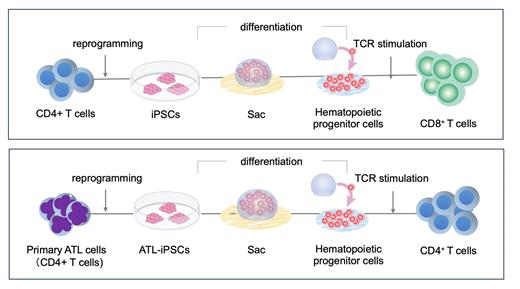iPSC-derived functionally rejuvenated antigen-specific cytotoxic T lymphocytes generated from exhausted CTLs show promising antitumor effect towards refractory tumors. Currently, we are preparing for clinical trials using iPSC-derived CTLs for EBV-associated lymphomas. These iPSC-derived T cells (iPSC-Ts) all generated into CD8 T cells, and stable generation of CD4 single positive (SP) T cells from iPSCs has never been accomplished without enforced CD4 gene transduction even though many research groups have challenged to do so. Even when an iPSC is established from a CD4 T cell clone, differentiating this iPSC does not generate into CD4 T cells, but in fact it generates into CD8 T cells. Therefore, we aimed to investigate why iPSC-Ts only differentiate into CD8T cells, and not into CD4T cells. We focused on adult T cell leukemia (ATL), because HTLV-1 infected CD4 T cells clonally expand. We reprogrammed CD4T cells obtained from acute-type ATL patients into iPSCs (ATL-iPSCs), then differentiated them into T cells using our established method.
Interestingly, ATL-iPSCs from different donors all successfully differentiated into CD4 SP T cells (ATL-iPSC-Ts). Upon characterization of ATL-iPSC-Ts we confirmed that they showed FOXP3 positive naive regulatory T cell (Treg) phenotype. To investigate the function of these cells, we performed 51Cr-release assay. The cytotoxicity of HTLV-1 Tax-specific CTLs (Tax-CTLs) with or without ATL-iPSC-Ts against primary ATL cells was measured. The percentages of ATL cells lysed by Tax-CTLs was 34 ± 3.2%, whereas by the addition of ATL-iPSC-Ts, the cytotoxicity decreased to 23.4 ± 1.0% revealing the functionally suppressive effect of ATL-iPSC-Ts.
In order to further understand the mechanism of CD4/CD8 T cell lineage choice, and discover the key regulators needed for generation of CD4 SP T cells from iPSCs, we performed single cell RNA-sequencing (scRNA-seq) on ATL-iPSC-Ts. As a control we used healthy donor (HD) CD4 SP T cell clone-derived iPSCs (HD-iPSCs), which differentiated into CD8 T cells (HD-iPSC-Ts [CD8 +]). We identified several genes expressed at a significantly higher level on HD-iPSC-Ts (CD8 +) than on ATL-iPSC-Ts (CD4 +). We presumed these genes to be essential for CD8 T cell differentiation. Therefore, we used CRISPR/Cas9 technology to knock out the respective gene in HD-iPSCs and confirmed if these iPSCs could differentiate into CD4 SP T cells, instead of CD8 T cells. This resulted in successful generation of CD4 SP T cells. We confirmed that these CD4 SP T cells were FOXP3 negative and were not Tregs. On the other hand, overexpression of this gene on ATL-iPSCs differentiated into CD8 SP T cells, instead of CD4 T cells.
In conclusion, our work represents the first successful generation of natural CD4 SP T cells from iPSCs. The gene we identified appears to be a pivotal regulator of CD4/CD8 T cell lineage choice in our iPSC-T differentiation system. While more investigation is required, our method shows promise towards facilitating stable generation of CD4 T cells for T cell therapy.
Disclosures
Ando:AbbVie Inc.: Honoraria, Research Funding. Nakauchi:Century Therapeutics: Consultancy. Ando:Chugai Pharmaceutical: Honoraria, Research Funding; Daiichi Sankyo: Research Funding; Century Therapeutics: Research Funding; Novartis Pharma: Honoraria; Sumitomo Pharma: Research Funding; Kyowa Kirin: Research Funding; AstraZeneca: Honoraria; AbbVie: Honoraria, Research Funding; Astellas Pharma: Honoraria.


This feature is available to Subscribers Only
Sign In or Create an Account Close Modal